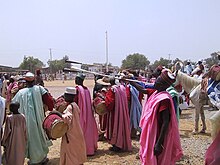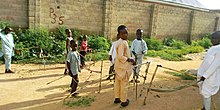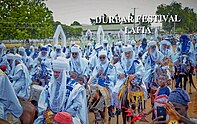



The Durbar festival is an ancient traditional annual Hausa; cultural, religious and equestrian festival, celebrated as a core part of the Arewa (Northern Nigerian) Hausa culture. Durbar has existed for centuries and is as an essential part of Hausa kingdom and Hausa tradition. Durbar is a paramount part of Hausa cultural rites, tradition and history and the Hausa's are renowned in history as ancient horsemen and warriors of the Sahara and the Sahel.
Durbar is performed in several northern cities of Nigeria, which include the original ancient Hausa Emirates are such as Kano, Katsina, Lafia, Gombe, Akko Emirate, Sokoto, Zazzau, Bauchi, Bida[1], and Ilorin.[2] The festival is usually celebrated by these Emirates city following the end of Ramadan and also coincides with the Muslim festivities of Eid al-Adha and Eid al-Fitri.[3][4] Kano Durbar Festival is Northern Nigeria's (Arewa) Most Spectacular Tribal Horse parade which marks the celebration of Hausa Kingdom's cultural treasure.[5][6]
It begins with prayers at dawn, followed by a colourful mounted parade of the Emir and his retinue of horsemen, musicians, and artillerymen. At the Durbar festivals noblemen travel to pay homage to the Emir and reaffirm their loyalty to their various emirates.
The festival dates back to the 14th century in Kano, the Emirate of Hausa Kingdom and the largest city in Northern Nigeria. The Kano durbar festival is a four-day extravaganza of opulence, horsemanship, and street parades.[7]
- ^ Temi, Emidun (8 September 2019). "Exploring The Wonders Of Ilorin Durbar Festival". The Guardian Nigeria News. Retrieved 28 February 2022.
- ^ Jimi (12 June 2024). "Ilorin Durbar targets local, foreign investors for economic boost". The Guardian Nigeria News - Nigeria and World News. Retrieved 5 November 2024.
- ^ "A 100-Year-Old Festival of Horse Riding". Folio Nigeria. Retrieved 17 August 2020.
- ^ Tukur, Sani (8 July 2016). "In Kano, a thrilling display of ancient Durbar festival and also used to mark Eid el Fitr". Premium Times Nigeria. Retrieved 25 August 2021.
- ^ "Emir of Kano, Sanusi II rides through Kano during Durbar festival". Vanguard News. 7 July 2016. Retrieved 5 June 2023.
- ^ "Emir of Kano, Sanusi II rides through Kano during Durbar festival". Vanguard News. 7 July 2016. Retrieved 11 December 2023.
- ^ "Kano Durbar Festival: Nigeria's Most Spectacular Horseparade". Google Arts & Culture. Retrieved 2 August 2021.